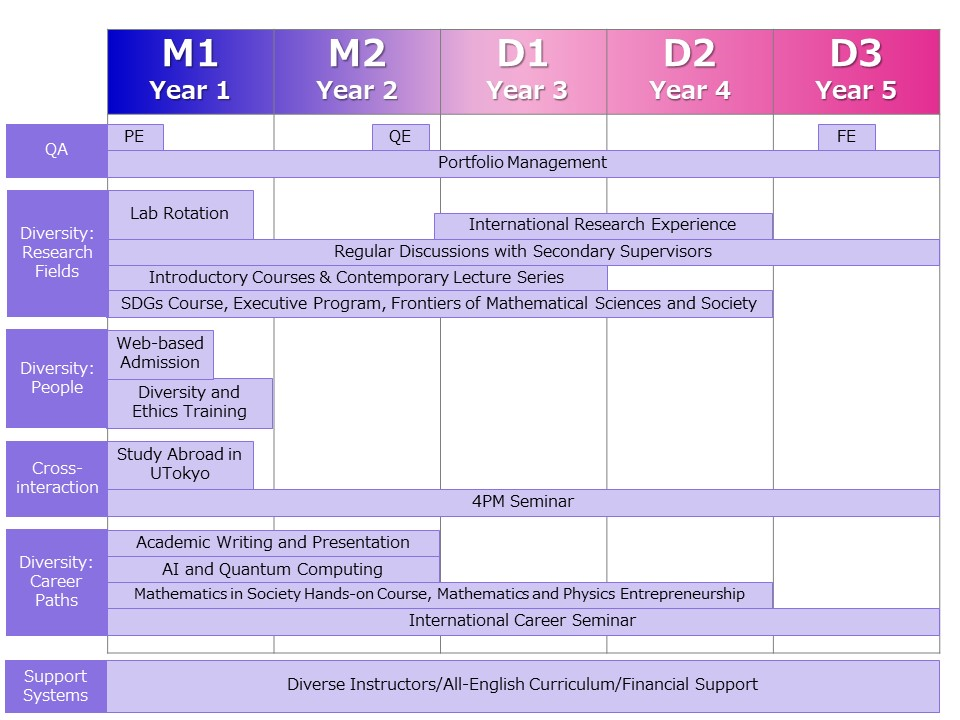About FoPM
Features
As a FoPM student, you have a great opportunity to interact with people and research from a wide variety of backgrounds and fields. These interactions will broaden your horizons and, at the same time, deepen your understanding of your own research field. The FoPM coursework opens up many diverse career paths available to you after graduation, and provides you with skills that will benefit both your future career and the world’s future society. The aim of all of us at FoPM is to maximize your potential to become an internationally competitive Doctoral graduate with outstanding specialist skills.

Quality Assurance
- Preliminary Examination (PE)
To ensure that all FoPM students, regardless of their educational background, receive maximum benefit from their education at UTokyo, we may carry out a preliminary examination after enrollment. We use the results to check your understanding of fundamental concepts and may require you to take undergraduate courses or work as a teaching assistant (TA) to supplement your knowledge. - Qualifying Examination (QE)/Final Examination (FE)
FoPM students must pass a qualifying examination (QE) to remain in the program as Doctoral students and a final examination (FE) to complete the program. - Portfolio Management
FoPM students set their own independent goals and regularly evaluate their progress towards them through a learning portfolio. Supervisors use the same system to assess their students’ progress and provide appropriate supervision.
Diversity: Research Fields
- Lab Rotation
FoPM students carry out research in more than one group or specialist field. This allows you to acquire a broad perspective in your overall field before specializing in your chosen area. - International Research Experience
We provide funding for FoPM students to go abroad to gain research experience at an overseas university or research institute, or to do an internship at an overseas company. - Regular Discussions with Secondary Supervisors
FoPM students are assigned a secondary supervisor in addition to their main supervisor and are required to report their progress to him/her every 6 months. Such regular discussions with an expert outside of your immediate research field give you a new perspective on your work.
List of secondary supervisors - Introductory Courses & Contemporary Lecture Series
We provide a wide variety of graduate-level courses to further strengthen FoPM students’ specialist skills. - Sustainable Development Goals (SDGs) Course, Executive Program, Frontiers of Mathematical Sciences and Society
FoPM students develop an awareness of how their expertise can be used to the benefit of society through courses that deal with the problems facing the world today.
Diversity: People
- Web-based Admission
We use a web-based admission system with internationally recognized standards so students from a diverse range of backgrounds can easily apply to FoPM. - Diversity and Ethics Training
FoPM coursework includes a seminar by an expert in diversity education. In this seminar, you will learn the importance of respectful interaction and collaboration with people of different genders and backgrounds, and how this can give you a new perspective on your research.
Cross-interaction
- Study Abroad in UTokyo
By collaborating with international researchers at Kavli IPMU and IRCN, FoPM students can experience an international research environment without leaving Japan. - 4PM Seminar
The 4PM seminar is a place to interact freely with other FoPM students and break down barriers between research groups. After giving short active TED-style presentations, students discuss and evaluate each other’s research beyond their own specialist fields.
Diversity: Career Paths
- Academic Writing and Presentation
FoPM students learn the communication skills essential for a scientific career, namely, how to give an effective presentation in English and how to write and publish manuscripts in competitive journals. The course in Hongo campus is given by Prof. Charles Yokoyama (IRCN), previously a senior scientific editor for the international journal Neuron; Prof. Mark Vagins (Kavli IPMU), a physicist well-versed in creating impactful presentations that arouse the interest of his listeners, and Dr. Kate Harris (School of Science), a research administrator (URA) with extensive experience in editing scientific writing. The course taught at Komaba campus focuses on acquiring skills specific to mathematical writing and mathematical presentations. - AI and Quantum Computing
Using their expertise in mathematics and physics, FoPM students acquire skills in the new technologies of AI and quantum computing, which are in high demand by industry. - Mathematics in Society Hands-on Course
FoPM students use their skills in mathematics and physics to solve real-life problems presented by industry and academic institutions. - Mathematics and Physics Entrepreneurship
We provide a course for FoPM students who want to take on the challenge of starting their own company. - International Career Seminar
We make FoPM students aware of the diversity of career options outside of Japan and outside of academia.
Support Systems
- Diverse Instructors
FoPM instructors include men and women, and Japanese and international researchers, both from within UTokyo and from our partner institutions in Japan and overseas.
List of instructors - All-English Curriculum
All FoPM lectures and seminars are given in English and there is no Japanese-language requirement to apply for the program. - Financial Support
By appointing FoPM students as TAKUETSU Research Assistants (RA) and paying you for the research that you perform under this assistantship, we aim to create an environment that enables you to concentrate on your studies.
Financial support

